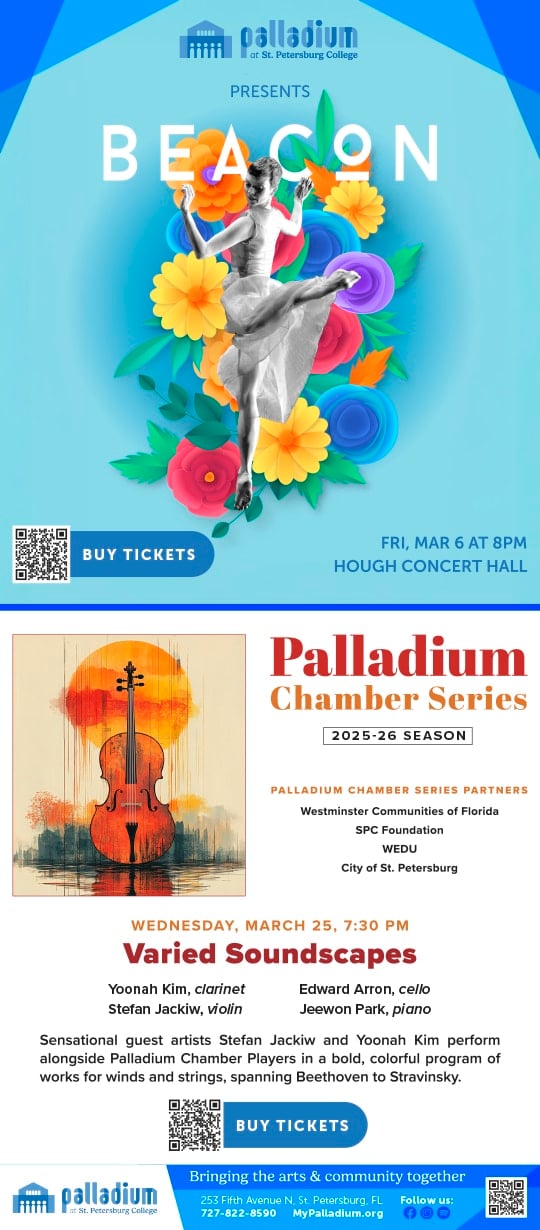With the recent budget cuts for arts funding in the state of Florida, it’s crucial to ask: how can we keep the arts thriving in our community? This question came to mind when one of the organizations we work with recently was awarded a generous donation earmarked for youth education in the performing arts. This prompted me to reflect on the true impact of such contributions. Do people stop and think about the profound effects that these funds have on others? We attend these events, and witness the checks being handed over, but do we truly grasp who benefits and how?
In June, the St. Pete Women’s Chamber of Commerce presented their donation to the Bill Edwards Foundation for the Arts. This act of generosity is commendable, but I often wonder if those who made this donation fully understand the positive ripple effect it creates. It’s easy to see it as a noble gesture, and indeed, every dollar counts. However, it’s crucial for those involved to recognize the tangible gains for the recipients: the students, the teachers, parents, families and those behind the scenes making it all happen, from scheduling to organizing and paying for school buses and performances.
Since Bill Edwards took over Class Acts program in 2011, more than 250,000 school children have experienced a wide variety of arts at the Mahaffey Theater, all free of charge. The primary goal of the Class Acts Program is to provide access to student groups facing economic challenges by offering complimentary admission to live performances and arts festivals along with transportation scholarships.
“One of the things that struck me immediately about Bill Edwards is his unwavering commitment to making arts and entertainment a vital part of our community,” said Amy Miller, President of Bill Edwards Foundation for the Arts. “Bill doesn’t just talk. He founded this organization with a profound conviction to provide arts access and make a positive impact through these programs. This is why I believe it’s so important to support his legacy and the foundation’s efforts.”
Are the real impacts of these donations getting lost in the process? Consider this: the funds provided don’t just contribute to an abstract idea of ‘arts education.’ They enable students to access transformative experiences, foster creativity, and build confidence. Teachers receive resources, guides, and support, which enhance their ability to inspire and educate. The logistical team ensures that each performance is a seamless and enriching cultural experience for both the audience and the young performers.
But a recent research project done in 42 elementary and middle schools in Houston, which was co-directed by Dr. Kisida and Daniel H. Bowen, a professor who teaches education policy at Texas A&M, is the first of its kind to do just that. Their research found that students who had increased arts education experiences saw improvements in writing achievement, emotional and cognitive empathy, school engagement, and higher education aspirations, while they had a lower incidence of disciplinary infractions.
What are the challenges in assessing inspiration? The positive outcomes extend far beyond the immediate beneficiaries. Communities are enriched as a whole when their youth are engaged in the arts. These programs cultivate future leaders, innovators, and artists who will continue to contribute to society in meaningful ways.
For kids in low-income neighborhoods, where residents may have less access to art and cultural resources that can improve their quality of life, school arts programs are especially important. An analysis from the National Endowment for the Arts, drawing on data from four longitudinal studies, found that students with high levels of arts involvement had more positive outcomes in a variety of areas, from high school graduation rates to civic participation.
Funding the arts in Florida
“With arts funding being on the front lines of budget cuts, it’s more important than ever for our community donors, sponsors, and leaders to understand the full impact these budget cuts have on our school children,” said Bill Edwards, Founder & CEO of the foundation that bears his name. “They want us to be inclusive, diverse, and accessible – but how are we supposed to accomplish that since these programs, performances as well as staff have a cost associated with accomplishing this?”
In short, it’s not just about the check. It’s about understanding and appreciating the cascade of benefits that follow. It’s about seeing the faces of the students who light up with new opportunities, the teachers who feel supported, and the behind-the-scenes staff who work tirelessly to make each event a success.
Bill Edwards laid a generous cornerstone by seeding the foundation with an initial $1 million donation. “In today’s evolving cultural landscape, relying on community support has become more crucial than ever to sustain and grow these vital artistic initiatives,” said Edwards.
So next time you witness a donation being made, take a moment to think about its journey. Imagine the classrooms filled with eager learners, the stages graced by young talent, and the community blossoming. The impact is profound and far-reaching, deserving of more than just a passing glance.
Funding the arts in Florida. Thank you.
Special thanks to the St. Pete Women’s Chamber of Commerce and all the generous donors and volunteers. Your contributions have an immeasurable impact on our future generations!









